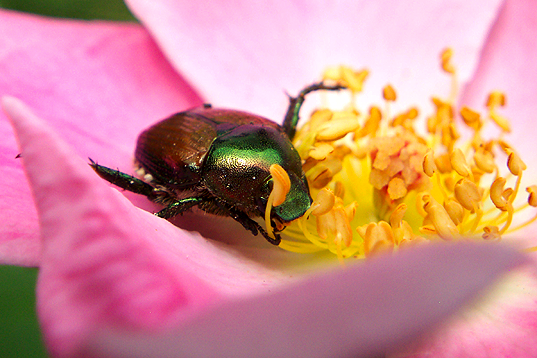New biocontrol for Japanese beetles: Gardeners can take some home to release in garden
On July 28, Michigan State University is hosting a Japanese Beetle Biocontrol Field Day at the Tollgate Research and Extension Farm in Novi. Entomologist Dr. David Smitley and horticulturists Mary Wilson and Bob Bricault will speak about a pathogen that infects Japanese beetles to reduce their population size. Attendees will be able to take home a small number of infected beetles to release in their gardens. The event is free and open to the public.

Photo by MrBrownThumb
Many home gardeners have cursed Japanese beetles and the lacework they make gnawing through rose foliage. But they also damage other shrubs and trees (such as lindens, serviceberries, crabapples, mountain ashes and purple leaf plums), crops (such as blueberries and corn), and turf grass (especially on golf courses).
To combat this damage, researchers at Michigan State University (MSU) and specialists at MSU Extension have established a new pathogen, Ovavesicula popilliae, to infect Japanese beetles. The project is supported by the Michigan Turfgrass Foundation, Project GREEEN, and the Michigan Department of Agriculture.
Pathogens are biological agents (sort of like germs) that infect or cause disease in their host. The Ovavesicula popilliae pathogen was introduced in several test sites in southeastern Michigan in 1999. Results to date show that infected Japanese beetle grubs are between 25 to 50 percent less likely to survive winter in the soil, and that female beetles emerging from infected grubs lay about 50 percent fewer eggs.
MSU wants to spread the pathogen beyond its test sites and is asking gardeners to help them disperse the infected beetles throughout Michigan. (Note: Beetles cannot be taken out of Michigan without a proper USDA-APHIS or Ag-Canada permit.)
MSU states the pathogen only infects other Japanese beetles and does not pose a threat to other insects, people or pets. It takes the pathogen, which will spread to other beetles over time and through generations, about six years to have a noticeable effect. It will not eliminate Japanese beetles entirely, but significantly reduce their populations.
Ironically, you've probably already noticed fewer Japanese beetles than normal this year, but that isn't related to the pathogen. It's because last July and August were so dry, and the grubs do not survive well in dry soils.
The field day event takes place in three separate sessions at 10 a.m., 10:30 a.m., and 11 a.m. a.m. at Tollgate, 28115 Meadowbrook Road, Novi (northwest corner of Meadowbrook and 12 Mile Road). Reservations are not required.
If you have a lot of Japanese beetles in your garden, why not attend and spread the pathogen? I will definitely attend, even though I don't have a problem with the beetles, to collect more information to report back to you. I'm not sure whether I'll take any beetles--because I don't have a problem I'm not sure I want to introduce any beetles into my garden. I am sure the MSU specialists will address this situation, and I'll act accordingly.
Monica Milla, the Garden Faerie, is a master gardener volunteer, garden speaker, garden coach, and author of "Fun with Winter Seed Sowing."


Comments
Monica Milla
Wed, Aug 4, 2010 : 11:17 a.m.
Pam, Have you "installed" the beetles yet? MBT, I hear ya. Time will tell. Always does. Doug, I'm going to guess Wayne Cty is on top of this trend, and if they're not they're not gonna listen to me, either. :)
doug perrin
Sat, Jul 24, 2010 : 11 p.m.
I am a hobby nature photographer and was in Edward Hines park between 6 and 7 miles last week. I noticed hundreds of Japanese beetles eating the clover in the grassy fields- in fact I got some great Macro shots. You could have the park maintenance people put your beetles out after or before cutting the grass.
Ramon
Wed, Jul 14, 2010 : 4:13 p.m.
When you brought this up the other day I was just thinking about why scientist didn't infect pests like rats, J. beetles, mosquitoes and release them into the wild where they could spread it to others. Then my overactive imagination (on account of watching too many epis of The Outer Limits) got the better of me and I started thinking about all the ways something like this could go wrong. Hope this works though!